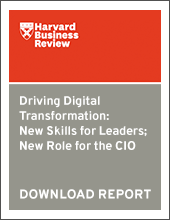American Cancer Society CIO Jay Ferro shares his thoughts on a recent Harvard Business Review report about the importance of CIOs educating the rest of the business on digital trends.
The Enterprisers Project (TEP): A global research study Red Hat recently completed with The Harvard Business Review surfaces an opportunity for CIOs to help business leaders better understand digital trends and how to leverage them. As a CIO, do you see a role here?
Ferro: Yes, I think it’s a terrific opportunity. It also leads my thoughts in a couple of directions. Consumerization has helped us as much as hurt us. It can sometimes be a challenge for a CIO because we hear often that people want every device, every app, and that they’re potentially breaking down our security checkpoints. It’s a fast moving train we have a handle on, but we have to stay vigilant. Security should always be a CIO’s top priority – no matter what. That said, we have to balance our security posture with availability and agility for the enterprise.
So the paradigm has shifted where it’s less about putting walls around your organization, although you still have to do that. It’s also just as much about educating and maturing the rest of your organization to understand the impact of the digital environment and digital trends.
TEP: How do you begin that education?
Ferro: You could start it with consumerization. I’m not saying that’s the only w

ay you approach it, but everything we’re doing as an IT shop, whether it’s social, mobile, analytics, cloud, or Internet of Things, has an analog in the consumer space. Nest, for example. “Do you remember when you were at the Home Depot and you looked at Nest?” Well, that’s Internet of Things. Social is easy as well.
TEP: Can you provide an example?
Ferro: Sure. When we talk about the mobile space, we talk about mobile payments and peer-to-peer fundraising. You and I are at an event, you want to make a donation to the American Cancer Society, you don’t have a checkbook, and you don’t have cash. But I happen to have our peer-to-peer fundraising app. I can take your credit card without any extraneous hardware, I can take it in a secure way, you get a receipt immediately via snail mail or email, and I see my fundraising thermometer go up almost instantly online in near real-time.
You may say, “Well, why does a CFO care about that?” Because what I just did was eliminate back-end reconciliation that used to cost the organization a lot of extra money. And that begins to start the conversation that you’ve eliminated mail that in many cases because most people never opt for. You’ve eliminated the postage, you’ve eliminated time, you’ve eliminated the cost of a person actually opening an envelope and putting it in some sort of ridiculous scanner and applying it to an event or applying it to a campaign, and we have the money immediately and it’s reconciled. Before that conversation, mobility is just something their kids did on their phone.
The Enterprisers Project: And the assumption is that you eliminate a lot of the technology lingo in describing this.
Ferro: Yes, you avoid technical lingo and apply it toward the business challenges you’re trying to face. Absolutely never walk in and say, “Let me tell you all about cloud and why it’s so great. And hybrid blah, blah, blah, and flex this, and fiber channel that, and software-defined network this.” Nobody cares. We care in IT, but they don’t. They’d rather hear about outcomes, speed to market, and agility. Those are things that are important, so that’s really the way we approach it.
The Enterprisers Project: Another thing that came out of this research is that there may be an opportunity for HR to team with IT to provide some of this education. Is that something you’ve taken advantage of at ACS?
Ferro: I think it’s an opportunity. We could be doing more at ACS, but I will tell you we’re off to a terrific start. HR, or Talent Strategy, as we call it, has been a terrific partner already. I realized very quickly we had a robust learning and development practice at ACS. And if you think about the nature of what we do with millions of volunteers and staff all over the world, obviously learning and development is a big part of what we do. We have to have people up on the latest research and trends.
So for all of our newer technology, we partner with talent strategy and develop roadmaps for how we educate our staff on these things. What we haven’t done, and I think you bring up a terrific opportunity, is educate our larger staff on the overall industry and say, “These are the big trends in IT right now and here is how your IT organization are leveraging them. Now – what do you think. We’d love to hear your ideas.”
ALSO READ
Jay Ferro is currently Chief Information Officer for the American Cancer Society (ACS), a nationwide,community-based voluntary health organization dedicated to eliminating cancer as a major health problem. Headquartered in Atlanta, Georgia, the American Cancer Society has hundreds of local offices nationwide and presence in more than 5,000 communities. Jay is responsible for the people, strategy and operations of the Global Information Technology organization. Additionally, Jay has been a leader in ACS’s historic transformation, which includes the consolidation of 12 independent divisions into one agile and focused global entity dedicated to saving more lives and curing cancer.




